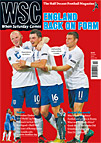 No one knows how much money hosting a World Cup makes (or loses). Ernst Bouwes reports
No one knows how much money hosting a World Cup makes (or loses). Ernst Bouwes reports
FA conservative analysis by [auditors] PWC calculates the economic benefit to England of hosting the FIFA World Cup™ at over £3.2 billion, creating thousands of new jobs and opportunities for the entire country.” So says the England 2018 bid on its website.
The 2006 finals allegedly generated €1.2bn (£900 million) in taxes for the German government, while Ruud Gullit, president of the joint Holland-Belgium 2018 bid, has claimed that South Africa 2010 had a turnover of “nine billion”, though he didn’t specify the currency. Whether meant euros or rand (ten of which make one euro), all of these are fantasy figures.
I have not found any substantial basis for PWC’s claims while the German windfall seems to have startled the Dutch parliament. Last May the government referred to these tax revenues when seeking support for the bid from the legislature. An MP who asked where that number came from didn’t get a reply. A German report from 2007 mentioned an “investment” of €1.4bn in stadiums and about €2bn in infrastructure before the 2006 World Cup but whether the federal state actually made a profit, we will never know.
Financial projections for a tournament taking place in eight years’ time can only be the vaguest of ballpark figures. The reputable economic research centre SEO estimated the output for a 2018 World Cup in Holland to be somewhere between a loss of €1bn and a profit of €400m. TV rights, sponsorship, merchandise and ticket sales don’t count as they all go to FIFA. They did, however, take into consideration that the usual Dutch travelling support will be spending their money at home for once. SEO’s research also pointed out that big sporting events hardly ever increase visitors to a city but simply replace one set of guests with another. The city of Vienna, for instance, experienced a substantial drop in business conventions around Euro 2008.
SEO expects that stadium renovations will make up 60 per cent of the total costs, while safety will take a big chunk as well. The total costs seem reasonable yet the Dutch organising committee wasn’t happy with the SEO report and demanded better figures to bring politicians and public onside.
Some football experts were duly called in to inflate the projected profits. This second opinion immediately reduced the costs of building Feyenoord’s New Kuip stadium. That should not be on the balance sheet, it was said, as it would be built anyway, while the temporary seating installed in other venues could be sold on to stadium builders after the tournament.
Another expert forecast that the daily expenditure of each tourist would be about £100 more than the SEO predicted. It was concluded that Holland might pocket a profit of €1bn during the tournament month. Approval for the bid went through the Dutch parliament without a peep, as it did in Belgium. The bid book was presented to FIFA the following week.
In August a FIFA committee came to check out both countries. Then all hell broke loose. Someone found out that FIFA had asked for a tax exemption during the tournament. This was already taken into account by SEO, and was expected to be only about €23m, but there is nothing worse in the Low Countries than finding out someone else is not paying his taxes.
Politicians in both nations were outraged, one Dutch MP claiming that they “would not stand for FIFA taking over our government”, although neither country had an elected cabinet at the time. A Dutch nation divided by a highly contentious spring election united in its protest against the “FIFA-billionaires” who think they can fill their coffers and leave the organisers broke. That over 95 per cent of the World Cup income will never even enter Dutch territory escaped most, even the tax experts.
However, the storm passed and the public now understands that hosting a World Cup might cost us some money instead of generating a windfall. If this is the only gaffe made by the Holland-Belgium bid, they could yet be strong outsiders for 2018.
From WSC 284 October 2010